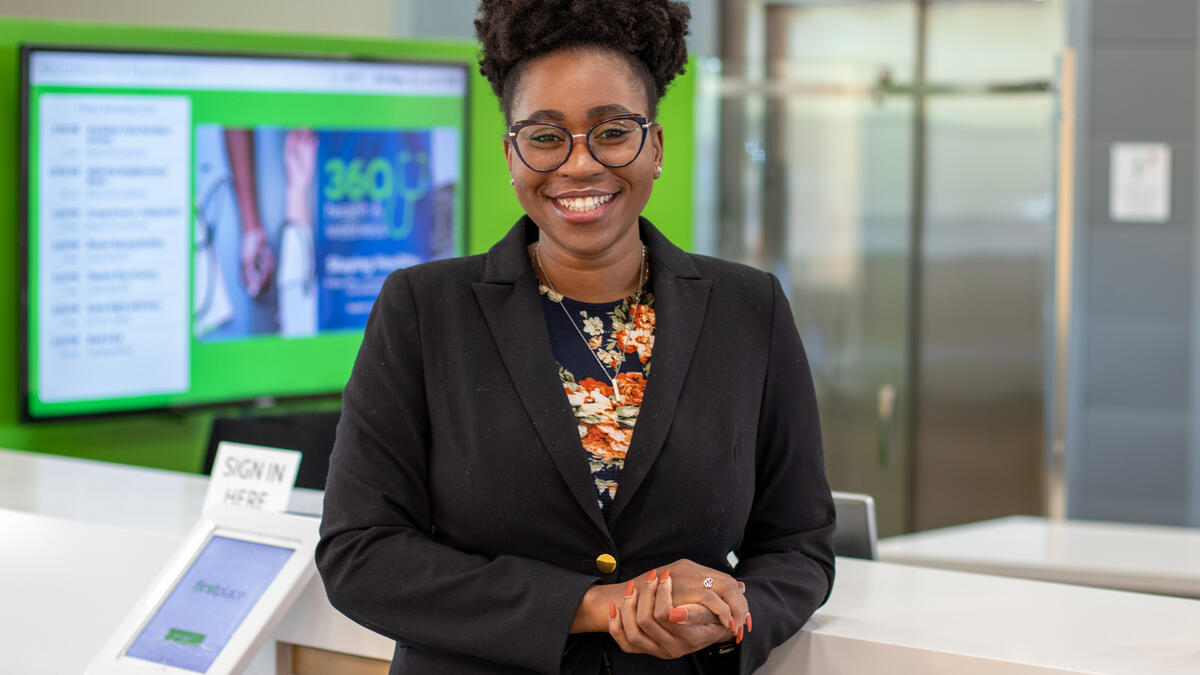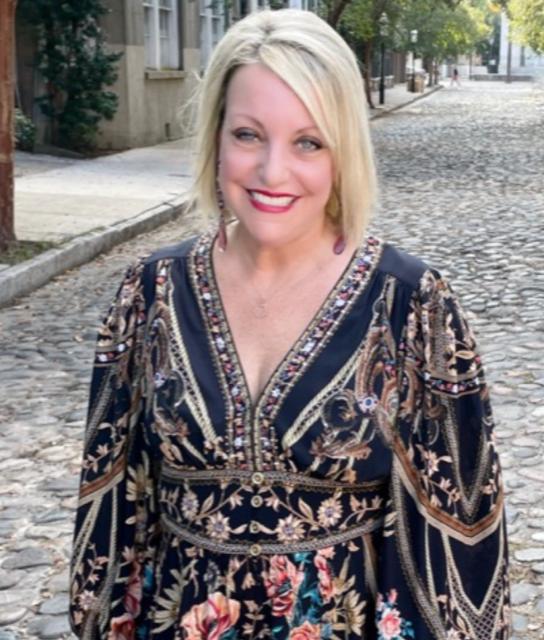Foundation supporting adults living with autism funds ASU public policy research fellowship

Public policy graduate student Toyosi Adesoye is The Daniel Jordan Fiddle Foundation fellow at ASU for 2021–22. Photo courtesy First Place AZ
Twenty years ago, Linda Walder wanted to create a lasting legacy for her son, Danny, who had been diagnosed with autism spectrum disorder (ASD) before his third birthday.
Danny never had the chance to grow up into the man his mother hoped he would become. He passed away at age 9. But as his mother cherished Danny’s memory, she learned that as they become adults, children diagnosed with ASD frequently do not receive important services to help them navigate through life. Many services are no longer available to them after age 18.
Danny’s legacy lives on through The Daniel Jordan Fiddle Foundation, which Walder co-founded in 2002 as the first nonprofit and only all-volunteer-run organization in the nation to focus on adult autism. Among the many programs, services and research initiatives that the foundation funds is an Arizona State University public policy research fellowship dedicated to solutions that ensure available and affordable housing.
The foundation celebrated its 20th anniversary in April, during Autism Acceptance Month. One of its chief aims is to ensure important services, such as housing, are available to people living with autism throughout their adult lives.
ASU’s current foundation fellow, Toyosi Adesoye, will earn her Master of Public Policy degree in December 2023 from the School of Public Affairs, part of the Watts College of Public Service and Community Solutions. The ASU fellowship was created in 2018 with funding from The Daniel Jordan Fiddle Foundation Adult Autism Public Policy Fellowship Fund.
Adesoye, who is ASU’s second Fiddle Fellow, works with the Watts-based Morrison Institute for Public Policy in collaboration with the First Place Global Leadership Institute. Adesoye is creating a national policy agenda and white paper to be distributed nationally and statewide to government agencies, lawmakers and policymakers.
Adesoye said the fellowship is a dream come true, an opportunity to serve neurodiverse people. The Place for Children with Autism defines neurodiversity as “the concept that when it comes to the human brain and nervous system, people don't all end up the same.”
“During the pandemic, I started looking into the availability of services for neurodiverse people. I began noticing the disparity between the support services available for adults and those available for children,” Adesoye said. “At the time, I was trying to help my friend secure both support and housing for her older brother, who is also on the spectrum. We both felt hopeless navigating the housing and support service system in California.
"I didn't know then that I would end up working with some of the most amazing, knowledgeable and empathetic people to create a program for affordable housing for neurodiverse adults.”
A partnership of two mothers
The First Place Global Leadership Institute is part of the charitable nonprofit, First Place AZ, which “offers supportive housing and a residential transition program for individuals living with autism and for other neurodiverse populations, as well as sites for education, training and creative inspiration,” according to its website.
Walder said she has known Denise Resnik, First Place AZ’s founder, president and CEO, since when both the foundation and a Phoenix-based organization Resnik co-founded, the Southwest Autism Research and Resource Center, were getting underway. Resnik’s son, Matt, is an adult with autism.
Linda Walder, co-founder of The Daniel Jordan Fiddle Foundation. Photo courtesy Linda Walder
“At that time, there weren’t many working with adult autism. She and I were among the few,” said Walder, who said she and Resnik began creating programs focusing on adults, as both saw how too many children with autism would grow up without reliable services.
Their initial partnership has blossomed over two decades into several successful collaborations on behalf of adults with autism, including the ASU Fiddle Fellowship.
Resnik described the First Place-Phoenix property as First Place AZ’s home and as a living, learning laboratory focused on determining what’s working and for whom, and what needs to work better to increase independence and life course outcomes for adults with autism.
“Since (First Place AZ’s) founding in 2012, the Global Leadership Institute has been focused on fueling a new generation of housing and community development,” Resnik said.
Research report focuses on barriers to affordable housing
Alison Cook-Davis, the Morrison Institute’s associate director for research, said the institute and the foundation's first ASU fellow, Pooja Paode, worked with First Place AZ to examine housing issues of adults with autism in 2019 and 2020. The institute developed a report, “A Place in the World: Fueling Housing and Community Options for Adults with Autism and Other Neurodiversities.”
Following up on Paode’s research for “A Place in the World,” Adesoye’s paper’s tentative title is “Beyond Tolerance: Looking Beyond Barriers to Affordable Housing.” Cook-Davis said Adesoye’s paper is in the editing process and should be published before the end of the semester.
While researching, Adesoye found a program specifically designed for individuals with HIV/AIDS available through the federal Department of Housing and Urban Development called Housing Options for Persons with AIDS (HOPWA), and suggests that a similar program could be devised for adults with autism.
“She calls it HOPAIDD, Housing Options for Persons with Autism and Intellectual Developmental Disabilities,” Cook-Davis said.
Coordination of housing with other services adults with autism need is a key goal for the fellowship, Cook-Davis said, as they are often separately funded. These adults need to be able to establish their housing and other needs on their own, as their parents might not always be there to assist them, she said.
“It’s difficult for people with high needs to navigate housing, and if you don’t have services come along with you, it’s very problematic,” Cook-Davis said.
Resnik said The Daniel Jordan Fiddle Foundation fellowship is an important part of First Place’s ongoing efforts in assisting adults with finding available and affordable places to live in concert with other vital services.
First Place AZ’s Maureen Casey, who directs the foundation's Center for Public Policy, said the public often doesn’t grasp how many needs of adults with autism must be attended to.
“People ask, why does it have to be housing and education and employment and health care?' Well, that’s because it’s all needed,” Casey said. “We say, folks with autism need more, and here are the supports they need, and how we can efficiently and effectively provide them, so they can make that progress.”
Listening to residents offered fellow insight
Adesoye said one of her most memorable days in the fellowship came one Friday afternoon when she listened to an audio interview with four residents at First Place-Phoenix in which the interviewer asked them what their hope is for the world.
“One of the residents said that he hoped people would understand that people with autism may not be able to do everything, but it doesn't mean that they can't do anything,” she said. “The residents went on to express that they hoped people would see them as people; be patient with them, stop stereotyping them, limiting them or being condescending towards them.”
Adesoye, who has a law degree, said since becoming a fellow, she has learned that “it is one thing to acknowledge the existence of neurodiverse people on a personal and societal level, but there is a step beyond that tolerance, and that step is acceptance, inclusion and love in every facet of society, and most definitely on a personal level. The residents at First Place taught me this, and I am forever grateful to them.”
Resnik praised Adesoye’s talent and dedication.
“Like many of our colleagues at First Place, she is out to change the world,” Resnik said. “We are eager to welcome more fellows and support the next generation of great leaders.”
Walder said Adesoye’s work is vital to enlighten those with the ability to effect change, not only in Arizona, but nationally.
“It will take a couple of years to get it rolling, but we’re on the way. Denise Resnik and The (Daniel Jordan Fiddle) Foundation have strong relationships,” Walder said. I foresee that we will again use this agenda and white paper developed by our fellow and collaborate with others to see the policymakers in Washington and elsewhere.”
Grateful to serve
Walder said she is “filled with gratitude” to be able to serve the autism community, whose members’ stories need to be told, through the foundation.
“There is more awareness (now), but these are people who, for a long time, have lived in the shadows. We need to create, first of all, the acceptance and value of people,” she said.
“I’m also proud of these endowment funds we established. They are the only ones at great universities focused on adult autism. You can have great grassroots programs, but they don’t last without funding,” Walder said. “Our organization is an all-volunteer organization. I feel fortunate that I can do it, that service, serving our world to make it a better place.”
More Law, journalism and politics

ASU Law to honor Africa’s first elected female head of state with 2025 O’Connor Justice Prize
Nobel Peace Prize laureate Ellen Johnson Sirleaf, the first democratically elected female head of state in Africa, has been named…

Native Vote works to ensure the right to vote for Arizona's Native Americans
The Navajo Nation is in a remote area of northeastern Arizona, far away from the hustle of urban life. The 27,400-acre…

New report documents Latinos’ critical roles in AI
According to a new report that traces the important role Latinos are playing in the growth of artificial intelligence technology…
